I am not proud to announce Super Grub2 Disk 2.02s3 stable.
Super GRUB2 Disk is a live cd that helps you to boot into most any Operating System (OS) even if you cannot boot into it by normal means.
A new stable release
The former Super Grub2 Disk stable release was 2.00s2 version and released on May 2014 (one year ago). This release does not have as many new features as the previous stable version but some of them are quite interesting:
- New option: ‘Disks and Partitions (Chainload)’ adapted from Smx work.
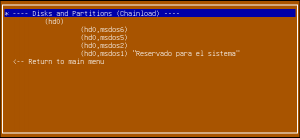
- New option: “Enable all native disk drivers” so that you can try to load: SATA, PATA and USB hard disks (and their partitions) as native disk drives. This is experimental.
- Most options had their search code improved. Super Grub2 Disk should be faster.
- Based on grub 2.02 ( commit: 8e5bc2f4d3767485e729ed96ea943570d1cb1e45 )
- Super Grub2 Disk builds its own grub based on upstream grub instead of Debian grub.
- Mac OS X kernel detection was improved to avoid false detections.
- Thanks to upstream grub improvement now Super Grub2 Disk supports booting in EFI mode when booted from a USB device / hard disk. Actually SG2D was announced previously to boot from EFI from a USB device while it only booted from a cdrom.
- Many options titles were rewritten so that they are better understood.
Let me repeat it slowly. With Super Grub2 Disk hybrid iso you will be able to boot from:
- EFI mode. Cdrom or DVD media.
- EFI mode. USB or hard disk media.
- BIOS mode. Cdrom or DVD media.
- BIOS mode. USB or hard disk media.
We are going to see which are the complete Super Grub2 Disk features with a demo video, where you can download it, the thank you – hall of fame and some thoughts about the Super Grub2 Disk development.
Please do not forget to read our howtos so that you can have step by step guides (how to make a cdrom or an usb, how to boot from it, etc) on how to use Super Grub2 Disk and, if needed, Rescatux.
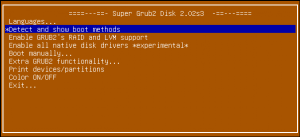
Tour
Here there is a little video tour in order to discover most of Super Grub2 Disk options. The rest of the options you will have to discover them by yourself.
Features
Most of the features here will let you boot into your Operating Systems. The rest of the options will improve the Super Grub2 Disk operating systems autodetecting (enable RAID, LVM, etc.) or will deal with minor aspects of the user interface (Colours, language, etc.).
- Change the language UI
- Translated into several languages
- Spanish / Español
- German / Deutsch
- French / Français
- Italian / Italiano
- Malay / Bahasa Melayu
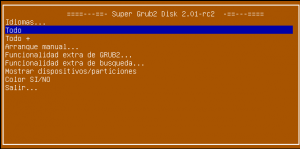
- Detect and show boot methods option to detect most Operating Systems

- Enable all native disk drivers *experimental* to detect most Operating Systems also in special devices or filesystems
- Boot manually
- Operating Systems
- grub.cfg – Extract entries

Super Grub2 Disk 2.01 beta 3 grub.cfg Extract entries option - grub.cfg – (GRUB2 configuration files)
- menu.lst – (GRUB legacy configuration files)
- core.img – (GRUB2 installation (even if mbr is overwritten))
- Disks and Partitions (Chainload)
- Bootable ISOs (in /boot-isos or /boot/boot-isos
- Extra GRUB2 functionality
- Enable GRUB2’s LVM support
- Enable GRUB2’s RAID support
- Enable GRUB2’s PATA support (to work around BIOS bugs/limitation)
- Mount encrypted volumes (LUKS and geli)
- Enable serial terminal
- Extra Search functionality
- Search in floppy ON/OFF
- Search in CDROM ON/OFF
- List Devices / Partitions
- Color ON /OFF
- Exit
- Halt the computer
- Reboot the computer
Supported Operating Systems
Excluding too custom kernels from university students Super Grub2 Disk can autodetect and boot most every Operating System. Some examples are written here so that Google bots can see it and also to make more confident the final user who searchs his own special (according to him) Operating System.
- Windows
- Windows Vista/7/8/8.1
- Windows NT/2000/XP
- Windows 98/ME
- MS-DOS
- FreeDOS
- GNU/Linux
- Direct Kernel with autodetected initrd
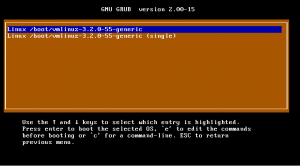
Super Grub2 Disk – Detect any Operating System – Linux kernels detected - vmlinuz-*
- linux-*
- kernel-genkernel-*
- Debian / Ubuntu / Mint
- Mageia
- Fedora / CentOS / Red Hat Enterprise Linux (RHEL)
- openSUSE / SuSE Linux Enterpsise Server (SLES)
- Arch
- Any many, many, more.
- Direct Kernel with autodetected initrd
- FreeBSD
- FreeBSD (single)
- FreeBSD (verbose)
- FreeBSD (no ACPI)
- FreeBSD (safe mode)
- FreeBSD (Default boot loader)
- EFI files
- Mac OS X/Darwin 32bit or 64bit
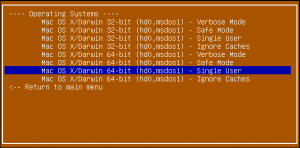
Support for different hardware platforms
Before this release we only had the hybrid version aimed at regular pcs. Now with the upcoming new EFI based machines you have the EFI standalone versions among others. What we don’t support is booting when secure boot is enabled.
- Most any PC thanks to hybrid version (i386, x86_64, x86_64-efi) (ISO)
- EFI x86_64 standalone version (EFI)
- Additional Floppy, CD and USB in one download (ISO)
- i386-pc
- x86_64-efi
Known bugs
- Non English translations are not completed
- Enable all native disk drivers *experimental* crashes Virtualbox randomly
Supported Media
- Compact Disk – Read Only Memory (CD-ROM)
- Universal Serial Bus (USB) devices
- Floppy (1.98s1 version only)
Downloads
Recommended download (Floppy, CD & USB in one) (Valid for i386, x86_64, and x86_64-efi):
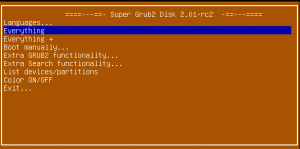
EFI x86_64 standalone version:
CD & USB in one downloads:
- Super Grub2 Disk (Floppy, CD & USB in one) 2.02s3 [i386-pc] (ISO)[Mirror #1]
- Super Grub2 Disk (Floppy, CD & USB in one) 2.02s3 [x86_64-efi] (ISO)[Mirror #1]
About other downloads. As this is the first time I develop Super Grub2 Disk out of source code (well, probably not the first time, but the first time in ages) I have not been able to build these other downloads: coreboot, i386-efi, i386-pc, ieee1275, x86_64-efi, standalone coreboot, standalone i386-efi, standalone ieee1275. Help is welcome on this subject.
Source code:
Everything (All binary releases and source code):
Hashes
In order to check the former downloads you can either download:
or you can check their contents right here.
MD5SUMS
e7515b7d4e9ea90f28b7f5a534906b85 super_grub2_disk_hybrid_2.02s3.iso 1538893f58fa9dbd3a1fd5a3789f7cb5 super_grub2_disk_i386_pc_2.02s3.iso 38260bfd2b93586a25b2db1a27072661 super_grub2_disk_standalone_x86_64_efi_2.02s3.EFI 247f2219579d1826cf6fbdbee37d1296 super_grub2_disk_x86_64_efi_2.02s3.iso
SHA1SUMS
e1f0da49d4e600383647875f773f6182a5e3f3c4 super_grub2_disk_hybrid_2.02s3.iso c4087937567d28f46f18c100ee047057d3acbac4 super_grub2_disk_i386_pc_2.02s3.iso 7af5cbbf947caa975a406b70c43fad803ba9c10d super_grub2_disk_standalone_x86_64_efi_2.02s3.EFI 1e49427f95dcff3dc0318f20bbe934b4a5eb3493 super_grub2_disk_x86_64_efi_2.02s3.iso
SHA256SUMS
74def37a1208e4e2f54bbe4bd1b66337b6f026a6c553a3b8e7db8e2206fd59ed super_grub2_disk_hybrid_2.02s3.iso ce46670541ed9506832d1bf255a454273ac493beee68e88f823687c8ae3cc340 super_grub2_disk_i386_pc_2.02s3.iso c4589c1d12fdf1260d025d11908f985a4e2b5c6b63e61d64ef0fc36e27613b30 super_grub2_disk_standalone_x86_64_efi_2.02s3.EFI 3ba7724f871f83d6996b74a529c79e6b7c237d7951eb642fd5fb7740f5d0464c super_grub2_disk_x86_64_efi_2.02s3.iso
Changelog (since former 2.00s2 stable release)
Changes since 2.02s2 beta 1 version:
- (Devel) grub-mkstandalone was deleted because we no longer use it
- Updated (and added) Copyright notices for 2015
- New option: ‘Disks and Partitions (Chainload)’ adapted from Smx work
- Many files were rewritten so that they only loop between devices that actually need to be searched into.
This enhacement will make Super Grub2 Disk faster. - Remove Super Grub2 Disk own devices from search by default. Added an option to be able to enable/disable the Super Grub2 Disk own devices search.
2.02s2 beta 1 changelog:
- Updated grub 2.02 build to commit: 8e5bc2f4d3767485e729ed96ea943570d1cb1e45
- Updated documentation for building Super Grub2 Disk
- Improvement on upstream grub (d29259b134257458a98c1ddc05d2a36c677ded37 – test: do not stop after first file test or closing bracket) will probably make Super Grub2 Disk run faster.
- Added new grub build scripts so that Super Grub2 Disk uses its own built versions of grub and not the default system / distro / chroot one.
- Ensure that Mac OS X entries are detected ok thanks to Users dir. This is because Grub2 needs to emulate Mac OS X kernel so that it’s detected as a proper boot device on Apple computers.
- Thanks to upstream grub improvement now Super Grub2 Disk supports booting in EFI mode when booted from a USB device / hard disk. Actually SG2D was announced previously to boot from EFI from a USB device while it only booted from a cdrom.
2.02s1 beta 1 changelog:
- Added new option: “Enable all native disk drivers” so that you can try to load: SATA, PATA and USB hard disks (and their partitions) as native disk drives. This is experimental.
- Removed no longer needed options: “Enable USB” and “Enable PATA”.
- “Search floppy” and “Search cdrom” options were moved into “Extra GRUB2 functionality menu”. At the same time “Extra Search functionality” menu was removed.
- Added new straight-forward option: “Enable GRUB2’s RAID and LVM support”.
- “List devices/partitions” was renamed to “Print devices/partitions”.
- “Everything” option was renamed to “Detect and show boot methods”.
- “Everything +” option was removed to avoid confusions.
- Other minor improvements in the source code.
- Updated translation files. Now most translations are pending.
- Updated INSTALL instructions.
Finally you can check all the detailed changes at our GIT commits.
If you want to translate into your language please check TRANSLATION file at source code to learn how to translate into your language.
Thank you – Hall of fame
I want to thank in alphabetical order:
- bfree (Niall Wash): For his work in rethinking how Super Grub2 Disk grub script might be rewritten although we never used that code. For adding code for EFI chainloader, helping on building and testing Super Grub2 Disk EFI releases.
- Jordan_U (Jordan Uggla) (jordan.uggla AT gmail DOT com): For his work in rewriting Lua Super Grub2 Disk into new Grub2 scripting. Also for his work in translation system based on gettext and po. And also I want to thank him for all this work in Super Grub2 Disk in many many ways.
- nox (Juergen Lock) (nox AT freebsd DOT org): For his work in fixing *BSD boot entries and helping adding new *BSD boot entries and testing.
- Smx (Stefano): For his Mac OS X / Darwin boot fixes and testing. He has also worked in redesigning some of the menues and probably his work will be included in next Super Grub2 Disk versions. He has also worked in a keyboard selection menu on his own too. That will be also included in next versions.
The person who writes this article is adrian15 and is proud of being responsible among other things for the rewriting of options as if they were libraries. And also for the User Interface (UI) complete redesign.
And I cannot forget about thanking bTactic, the enterprise where I work at and that hosts our site.
Some thoughts about Super Grub2 Disk development
Super Grub2 Disk development to be stalled
There has not been too much feedback for Super Grub2 Disk betas. Hopefully this new stable release come back with new bugs (Yes, it’s sad to say so). As I want to focus on new Rescatux stable if no one wants to help on Super Grub2 Disk development there won’t be any new release (stable or beta) in a long time.
Rescatux development
I want to focus on Rescatux development on the next months so that we have an stable release on July 2015. I will probably base it on newest Debian Jessie.
(adrian15 speaking)
you guy should think about charging a couple of dollars for Rescatux and SuperGrub. I see where the Parted Magic fellow is now charging $9 for that iso. A little bit of money might help these kind of projects. 🙂
I prefer to have beta testers.
Thank you for your efforts!
Please correct to read “I am now proud to announce Super Grub2 Disk 2.02s3 stable.”
Daniel Villarreal
It was not a TYPO.
Hopefully for the next Rescatux release someone will beta test it and I will be able to be proud.
adrian15.